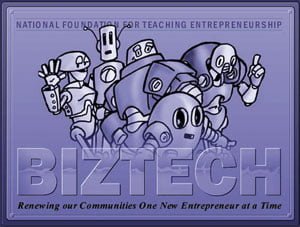
Many people dream of owning their own business and being their own boss, but most hesitate to take the plunge. Like them, you may worry that you don’t have enough money, time, or experience to operate your own small business.
Michelle Araujo insists there is always time, as a single mother and full-time college student. Michelle should know, because at 19 she started her own business while attending college and caring for Angela, 3, Erica, 18 months and newborn son, Kristian. Before starting her clothing re-sale company, A La Mode Fashions, Michelle knew nothing about business and had little money. Today, she’s a successful entrepreneur and a prime example of a young American who has benefited from the good work of NFTE.
NFTE (pronounced ‘nifty’) is the National Foundation for Teaching Entrepreneurship. It is an international, non-profit charitable organisation which introduces low-income teenagers to entrepreneurship, teaching them to develop and run their own small businesses. The initiative has been made possible by the support of large organisations and individuals who seek to build a better, more caring community.
NFTE students learn to set up and run their own enterprises. They have role models like Michelle, Bill Gates of Microsoft who tried his first business at 13 and founded Microsoft at the age of 19 and Berry Gordy. Raised in a tough Detroit ghetto, Berry set up the Motown Record Company, which discovered artists such as Michael Jackson and Stevie Wonder. Michelle, Bill Gates and Berry Gordy are all entrepreneurs who have created successful businesses. Whether small businesses or harvest/fast growth enterprises – each is valuable to merging creative interests and passions with financial reward for the entrepreneur, co-workers and the community.
This case study shows how many young people in the United States have been encouraged to improve their numeracy, literacy and communication skills by learning through ‘enterprise’. NFTE is a world leader in the field of youth entrepreneurship with its UK headquarters based at Regents College, Regents Park, London.
Vision
NFTE’s vision is to foster economic self sufficiency among children/teens in need worldwide. Its mission is to provide excellent curriculum, teacher certification and alumni/graduate support. Educational research shows people learn best when introduced to new ideas in a meaningful context. If they can see the value of what they are learning and relate it to their own interests, their motivation is far greater.
The driving force behind the US development of NFTE was Steve Mariotti. With experience of business and working with young people, he identified entrepreneurship as an opportunity to capture the imaginations of deprived young people. Steve studied economics before working at Ford Motor Company but found working for a large company restrictive and set up his own successful import/export business. During this period Steve had a life changing experience. He was mugged by teenagers and as he had very little money on him their actions were largely futile. He felt their energies could be better spent running their own legitimate business thus generating much higher returns without resorting to violence or drugs.
To understand their problems he became an inner city school teacher. He was dismayed to discover that young people had a negative attitude to maths, reading and communication, the very skills they needed for successful careers. Steve started teaching youngsters about running a business. They were excited by enterprise and this helped them to develop their all-round educational skills. Working with other enthusiasts, Steve founded NFTE in 1987. The organisation spread rapidly across the US, supported by major companies, such as Microsoft and Goldman Sachs. They could see the importance of helping everyone to contribute as valued members of an “inclusive society”.
Businesses can only be really successful in communities that value all of their people. Organisations have a responsibility to improve the communities around them, so quality companies try to promote a caring society. The Brenninkmeyer family who have a number of different business interests throughout the world and who support many worthwhile charitable organisations typify this approach.
Clemens and August Brenninkmeyer were two brothers, who in their early 20’s opened the first C&A store in Holland in 1841. Today, the global retail company is still owned and operated by the family, with its behaviour based on family values. This explains the company’s enthusiasm for initiatives such as NFTE-UK that are aimed at helping the disadvantaged in society. The Brenninkmeyer Family quickly saw the value of NFTE in the US and did not hesitate to become a sponsor. Stephen Brenninkmeyer became the first Chairman of the NFTE Trustees in the UK to endorse their support.
NFTE in the UK

NFTE fits well with recent educational and social developments in the UK. The curriculum in UK schools now places stronger emphasis on vocationalism, preparing young people for adult responsibilities and working life. A range of vocational subjects is taught, with business proving one of the most popular options. NFTE-UK maintains that universal entrepreneurial literacy is an essential ingredient to the long term strength of the UK.
The 1990s saw an increase in initiatives, such as The Prince’s Trust, that support enterprise in areas of deprivation, by giving young people free advice and support whilst they develop their own business ideas. NFTE-UK and The Prince’s Trust are developing synergistic models to serve deserving youth even more effectively. Since 1997, the government has promoted the idea of an ‘inclusive society’. This makes education, good health and the opportunities to make a living and set up in business available to everyone. This matches NFTE’s vision which is: ‘To bring economic self sufficiency to low income youth around the world.’
The current Prime Minister Tony Blair has called on businesses and educators to actively empower socially excluded young people with new skills, hope and vision. NFTE believes that its experience in working with 30,000 youth plus 2,000 teachers and youth workers in 15 countries will greatly benefit these young people.
Despite large capital and social investment in the past the UK still has areas of economic and social deprivation. Thus there is scope for both government and the private sector to improve the education and development of young people. NFTE-UK looks forward to an exciting public-private partnership.
The structure and function of NFTE-UK
NFTE-UK’s vision is: ‘To provide every disadvantaged young person with the knowledge and confidence to achieve economic self sufficiency.’
The social objectives of NFTE-UK are to:
- teach young people to build businesses
- prepare NFTE students to succeed in school and the workplace
- link educators, businesses and civic leaders to the lives of socially excluded young people
- support and develop partnerships with organisations that share NFTE’s vision and that can help deliver its UK targets.
NFTE’s tactics are based around three core competencies:
- Training and developing teachers to support the initiative
- Developing curricula and materials that are both print and internet based
- Providing continuing support and advice for former students as they develop their enterprises.
The ease with which NFTE-UK has been able to develop the programme is largely due to support for the initiative from partners including The DfEE, The Technology Colleges Trust and The European Business School London. NFTE wants to nurture young people with entrepreneurial dreams. The larger goal, however, is to help renew the spirit of enterprise in inner cities through youth and teacher training, curricula research and development and public education forums.
Relationships will be established with appropriate business partners to ensure a high impact programme that is delivered:
- in schools
- out of school
- on an ongoing basis for NFTE-UK graduates who are developing their own businesses.
Supporting learning

Rigorous scientific research methodology has been used to evaluate NFTE’s impact. Statistically successful participants in the NFTE scheme in the US show a significantly higher level of business understanding and ability than non-participants.
Research from a control and experimental cohort shows that NFTE educated students learn 30 times more than non-NFTE students about critical business knowledge. Long term (5 years) research indicates NFTE students view themselves as much more entrepreneurial than the general population and are choosing more productive behaviours than non-NFTE peers.
NFTE has developed a series of publications and learning systems to support the enterprise curriculum. These include the NFTE BizTech Learning system which was developed with Microsoft. NFTE BizTech is an entrepreneurship programme that teaches business, IT and workplace concepts via the Internet through its specialised curriculum.
Conclusion
NFTE is not just about helping young people set up their own businesses. It also helps them to stand on their own feet, and become more productive and responsible in general society. It enables young people to take a more realistic view of the challenges they face in life and to develop the skills they need to succeed.
The programme’s directors argue that entrepreneurism teaches young people something valuable about opportunity, making your own luck, building self-esteem and understanding the real world. For example, girls starting a NFTE course asked to estimate the cost over one year of having a baby, guessed about $150. Upon completion their estimates were more realistic, nearer $6,000.
NFTE enables young people to develop the skills and understanding to make a success of their lives. At eighteen, Omayra Rodriguez Matthews had a one-year old son, Peter. Omayra set up a business called Peter’s Party Favours making Latin American party gifts, called capias, table centrepieces and refrigerator magnets. Omayra joined the entrepreneurship course and learned how to turn a hobby and passion into a moneymaking venture.
Another NFTE participant, Byron Bennett, set up ‘Room Mates Central’. This Internet-based service brings together young people in New York City who are seeking room mates. The Internet site (www.roommatescentral.com) provides a state-of-the-art service. To create his business, Byron carried out detailed business planning to establish the size of his market, how to raise finance and the projected profit. Byron quickly learnt that there is no substitute for serious planning to turn an exciting proposition into a successful business.
Another young ‘graduate’ of NFTE sums up the philosophy of the venture when she states: ‘I do not want to die in poverty; I want poverty to die in me.’
